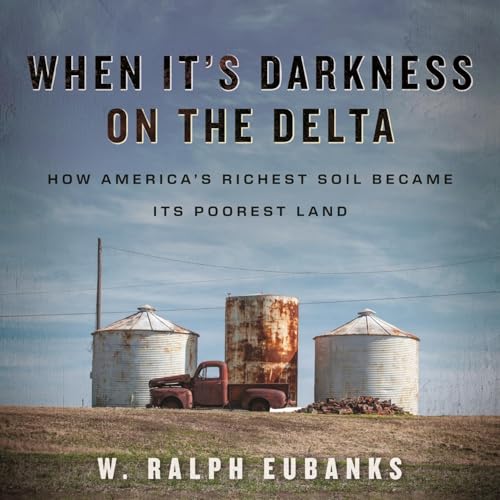
When It's Darkness on the Delta
How America's Richest Soil Became Its Poorest Land
Artikel konnten nicht hinzugefügt werden
Leider können wir den Artikel nicht hinzufügen, da Ihr Warenkorb bereits seine Kapazität erreicht hat.
Der Titel konnte nicht zum Warenkorb hinzugefügt werden.
Bitte versuchen Sie es später noch einmal
Der Titel konnte nicht zum Merkzettel hinzugefügt werden.
Bitte versuchen Sie es später noch einmal
„Von Wunschzettel entfernen“ fehlgeschlagen.
Bitte versuchen Sie es später noch einmal
„Podcast folgen“ fehlgeschlagen
„Podcast nicht mehr folgen“ fehlgeschlagen
 Bist du Amazon Prime-Mitglied?
Bist du Amazon Prime-Mitglied? Audible 60 Tage kostenlos testen
Aktiviere das kostenlose Probeabo mit der Option, monatlich flexibel zu pausieren oder zu kündigen.
Nach dem Probemonat bekommst du eine vielfältige Auswahl an Hörbüchern, Kinderhörspielen und Original Podcasts für 9,95 € pro Monat.
Wähle monatlich einen Titel aus dem Gesamtkatalog und behalte ihn.
Für 32,95 € kaufen
-
Gesprochen von:
-
JD Jackson
-
Von:
-
W. Ralph Eubanks
Über diesen Titel
Once the powerhouse of a fledgling country’s economy, the Mississippi Delta has been consigned to a narrative of destitution. It is often faulted for the sins of the South, portrayed as a regional backwater that willfully cleaved itself from the modern world. But buried beneath the weight of good ol’ boy politics and white-washed histories lies the Delta’s true story.
Mississippi native and award-winning writer W. Ralph Eubanks unearths the region’s buried history, revealing a microcosm of economic oppression in the US. He traverses the Delta, examining its bellwether efforts to combat income inequality through vivid portraits of key figures like
- Theodore G. Bilbo and William Whittington, segregationist congressmen who sabotaged federal reparations for former sharecroppers in the 1940s and ’50s
- Gloria Carter Dickerson, founder of the Emmett Till Academy, whose parents were instrumental in desegregating schools in Drew, MS, where Till was murdered
- Calvin Head, a community organizer who runs a farming co-op in Mileston, who revived the legacy of his hometown, the only Black resettlement community in Mississippi
Eubanks delivers a powerful and insightful examination of how racism and economic instability have shaped life in the Mississippi Delta. He traces the enduring consequences of political decisions that have entrenched inequality across generations. At the same time, he brings attention to the resilience of local communities and the grassroots movements working toward meaningful change. The book offers a thoughtful framework for policy reform and community investment, underscoring the need to support those who have long sustained the region through their labor and lived experience.
Kritikerstimmen
“Native son, erudite scholar, and deep-seeing observer, Eubanks gets down into the nitty-gritty of Mississippi with this marvelous Delta travelogue and analysis. He makes those lonely backroads come alive in all their difficult, complicated history.”
—Richard Grant, author of Dispatches from Pluto: Lost and Found in the Mississippi Delta
“When It’s Darkness on the Delta is as brilliant and necessary as the greatest books made by a Mississippian, but it is wholly singular in the way Ralph Eubanks nimbly, and profoundly, rides the voices of the folks making the Delta today. This book is not interested in representation; it is what happens when the responsible love of a people, a region, and an utterly legendary skill meet. Goodness gracious. We are thankful.”
—Kiese Laymon, author of Heavy
“This is an important book. Eubanks speaks truth to power about an iconic and ill-understood American landscape and proves beyond question that as the Mississippi Delta goes, so goes our republic.”
—Richard Ford
“I am from the coast of Mississippi. Growing up, the Delta was as foreign to me as another country. They talked differently up there. The air didn’t smell right. But W. Ralph Eubanks’s When It’s Darkness on the Delta brings the Delta home to me. With stunningly beautiful prose and an intimacy that breaks down assumptions, he renders this part of Mississippi with tenderness and unflinching honesty. He tells its story (his family’s story) and, in doing so, he tells the American story. And, even though it is one filled with resilience, it ain’t pretty. What a precious gift.”
—Eddie S. Glaude Jr., author of Begin Again
—Richard Grant, author of Dispatches from Pluto: Lost and Found in the Mississippi Delta
“When It’s Darkness on the Delta is as brilliant and necessary as the greatest books made by a Mississippian, but it is wholly singular in the way Ralph Eubanks nimbly, and profoundly, rides the voices of the folks making the Delta today. This book is not interested in representation; it is what happens when the responsible love of a people, a region, and an utterly legendary skill meet. Goodness gracious. We are thankful.”
—Kiese Laymon, author of Heavy
“This is an important book. Eubanks speaks truth to power about an iconic and ill-understood American landscape and proves beyond question that as the Mississippi Delta goes, so goes our republic.”
—Richard Ford
“I am from the coast of Mississippi. Growing up, the Delta was as foreign to me as another country. They talked differently up there. The air didn’t smell right. But W. Ralph Eubanks’s When It’s Darkness on the Delta brings the Delta home to me. With stunningly beautiful prose and an intimacy that breaks down assumptions, he renders this part of Mississippi with tenderness and unflinching honesty. He tells its story (his family’s story) and, in doing so, he tells the American story. And, even though it is one filled with resilience, it ain’t pretty. What a precious gift.”
—Eddie S. Glaude Jr., author of Begin Again
Noch keine Rezensionen vorhanden



